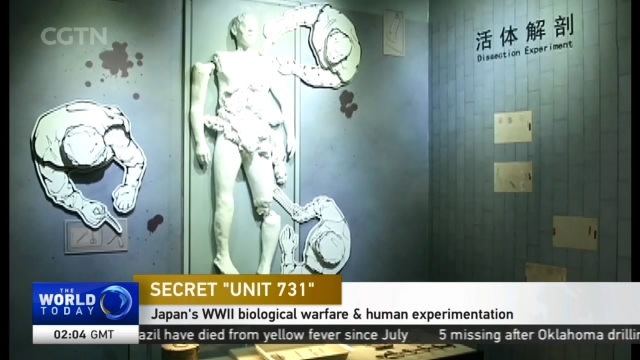
10:36, 23-Jan-2018
Secret 'Unit 731': Japan's WWII biological warfare & human experimentation

Now here's a closer look at Japan's notorious Unit 731 group.
Unit 731 was a covert biological and chemical warfare research and development group within the Imperial Japanese Army. It was at the center of Japan's biological warfare in China and Southeast Asia during World War Two, and responsible for some of the region's worst atrocities of that time.
It was based in the Pingfang district of Harbin, the largest city in what was then the Japanese puppet state of Manchukuo, and now the capital of northeast China's Heilongjiang Province.
The unit was officially known as the Epidemic Prevention and Water Purification Department of the Kwantung Army. But nearly 270-thousand people died at its hands, as they conducted human experiments on both captured civilians and military officers, ranging from Chinese and Koreans to Mongolians and Russians.
One of their most infamous experiments were called vivisections, where prisoners were dissected alive, usually without anesthesia, to study the effects of various procedures or diseases, such as amputations, or gangrene. The infected and vivisected prisoners included pregnant women, the elderly, children, and infants.
Other areas of interest for the unit included weapons testing. Human targets were used to test grenades placed at various distances and in different positions. In other tests, subjects were deprived of food and water to determine the length of time until death. Others were exposed to lethal doses of X-rays or subjected to various chemical weapons inside gas chambers. In one experiment, male and female prisoners were deliberately infected with syphilis and gonorrhea, so that the unit could study the effects of untreated venereal diseases.
Unit 731 also helped develop the plague-infested fleas that would be dropped by Japanese planes to various Chinese cities, leading to hundreds of thousands of deaths from bubonic plague epidemics.
While these heinous experiments were supported inside the army, there were attempts to cover them up to the outside world.
Researchers recently discovered incineration pits and traces of explosives left at the unit's former headquarters, which suggests the Japanese army tried to destroy evidence of war crimes before their retreat.
Indeed, biological warfare has been consistently prohibited by international law.
The 1925 Geneva Protocol clearly condemns the use of such weapons.
The subsequent 1972 Biological Weapons Convention and 1993 Chemical Weapons Convention re-affirmed this ban. Their texts covered not only the use but also the development, production and stockpiling of biological and chemical weapons.
Recent moves by the Japanese cabinet to push through a new package of security bills, which would lift various restrictions put in place after World War Two, has drawn widespread criticism and prompted renewed calls to never forget the pain, suffering, and death of war's victims.

SITEMAP
Copyright © 2018 CGTN. Beijing ICP prepared NO.16065310-3
Copyright © 2018 CGTN. Beijing ICP prepared NO.16065310-3